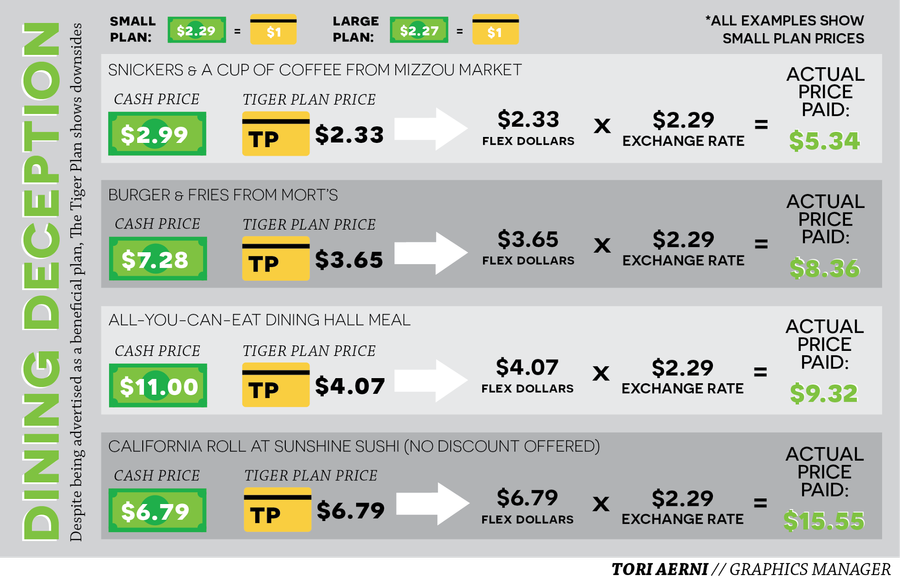This fall, Campus Dining Services unveiled its shiny new meal plan option: The Tiger Plan. [The Tiger Plan](https://www.themaneater.com/stories/2016/9/12/breakdown-tiger-plan-cdss-new-campus-dining-plan/) has been pushed as a flexible meal plan for off-campus students to eat while on campus. The plan can be used at dining halls, a-la-carte locations, including Student Center dining, and Mizzou Markets. It sounds like a great deal on the surface, but in reality, the plan is deceiving and ripping off students.
The Tiger Plan comes in two sizes: The smaller plan costs $800, and the larger plan costs $1,430. Each of these plans has a “base cost,” a flat fee that does not go toward your spending amount but instead goes directly toward CDS operating costs. The base cost for the smaller plan is $450, while the base cost for the larger plan is $800.
After the base cost, students are left with what are called “flex dollars,” which you can actually spend at CDS locations. The smaller plan has 350 flex dollars, and the larger plan has 630 flex dollars.
You might already be asking, “Why would I buy this if I get less money than I pay in?”
CDS makes up for this by offering discounts at CDS locations for those with the plan. All-you-can-eat dining halls offer a 63 percent discount, a la carte locations offer a 50 percent discount, and Mizzou Market locations offer a 20 percent discount.
But this discount is applied only to the flex dollars; the base cost is excluded from the discount. With the base cost factored in, each flex dollar is equal to about $2.29 on the smaller plan and $2.27 on the larger plan. That’s right — you’re essentially paying $2.29 or $2.27 for $1 to spend.
You can technically save money on The Tiger Plan by eating exclusively at all-you-can-eat dining halls, but you will never save 63 percent of what you spent with the base cost factored in. Eat at only a-la-carte locations, and you will be losing money on the plan.
The only way to save money on The Tiger Plan is to eat exclusively at all-you-can-eat dining locations, but even then, it is a better value to go with a traditional block dining plan. If you were to spend $1,430 on the larger Tiger Plan, each lunch or dinner in an all-you-can-eat location would be worth $9.24. But if you bought the smallest traditional on-campus dining block plan, in which you receive 175 meal swipes for $1,380, each meal in an all-you-can-eat location would be worth $7.89.
The best way to save money with The Tiger Plan is to never buy it in the first place. Much better alternatives are already in place.
The advertising of this plan is deceiving to students and parents purchasing the plan. While the people purchasing the plan should take a closer look at what they are spending their money on, CDS is trying to present The Tiger Plan in a false light. While CDS provides these “discounts,” and you can slightly increase the value of a flex dollar by paying to add up to another 100 flex dollars to your account, a flex dollar will never be equal to a true dollar.
If you have bought The Tiger Plan and are thinking, “Man, this sucks! I want my money back,” you’re out of luck: You can be refunded your flex dollars, but not the base cost. No matter what happens, if you try to get a refund, you will be out at least $450.
But wait: It gets worse.
Flex dollars also don’t roll over to the next semester, similar to block dining plans. According to CDS director Julaine Kiehn, this was in order to “avoid confusion.” But we are the confused ones. There is no reason the dollars should not roll over to the next semester. If E.Z. Charge can roll over, why not flex dollars?
While it is in the hands of the consumer to look at businesses with skepticism when purchasing products, many people don’t realize that CDS is still a business. Therefore, it doesn’t receive the kind of skepticism that it deserves. And as a business, CDS is trying to rip off its customers. Despite this, though, we do appreciate the care shown for students by the beloved Adela Caratti at The Mark on 5th Street.
This plan has supposedly been in the works for five years, and this is what they have come up with. Last year, the plan was presented to both the Missouri Students Association and the Residence Halls Association. Why didn’t these student governments do anything to stop a plan that swindles students? It’s a disappointment and a shame that they didn’t look at it closely enough to realize that it was a scam.
When you break it down, The Tiger Plan is a horrible deal for students and a great way for CDS to make money. Campus Dining Services needs to do better for its customers and stop trying to deceive students for no one’s benefit but their own.










